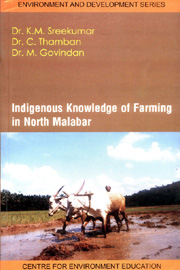Book contents
- Frontmatter
- Contents
- Foreword
- Preface
- Acknowledgements
- List of Photographs and Illustrations
- List of Tables
- List of Plants
- 1 Introduction
- 2 Agricultural Scenario in North Malabar
- 3 Farming Related Rituals
- 4 Rice
- 5 Coconut
- 6 Arecanut
- 7 Black Pepper
- 8 Cashew
- 9 Fruit Crops
- 10 Wild Fruits
- 11 Rubber
- 12 Spices
- 13 Tuber Crops
- 14 Vegetable Crops
- 15 Natural Resource Management
- 16 Indigenous Farm Implements
- 17 Miscellaneous Practices
- 18 Conclusion
- References
- Annexure I
- Annexure II
13 - Tuber Crops
Published online by Cambridge University Press: 05 November 2011
- Frontmatter
- Contents
- Foreword
- Preface
- Acknowledgements
- List of Photographs and Illustrations
- List of Tables
- List of Plants
- 1 Introduction
- 2 Agricultural Scenario in North Malabar
- 3 Farming Related Rituals
- 4 Rice
- 5 Coconut
- 6 Arecanut
- 7 Black Pepper
- 8 Cashew
- 9 Fruit Crops
- 10 Wild Fruits
- 11 Rubber
- 12 Spices
- 13 Tuber Crops
- 14 Vegetable Crops
- 15 Natural Resource Management
- 16 Indigenous Farm Implements
- 17 Miscellaneous Practices
- 18 Conclusion
- References
- Annexure I
- Annexure II
Summary
Tuber crops add to the food security of many rural households. Different tuber crops are cultivated in the homesteads, paddy fallows and garden lands. Some of them are grown wild and some are cultivated.
Sweet Potato
Sweet potato is regularly cultivated in vast stretches of paddy fallows and garden lands in many parts of Kasaragod district. Localities like Kanhangad, Pallikkara, and Ajanur are popular for sweet potato cultivation in the district.
Varieties
Kanhangad local is a variety of sweet potato having comparatively better yield and is relatively free from pests and diseases.
Planting Materials
Healthy vines with three nodes are selected for planting. The vines are planted with two nodes inside the soil.
Application of Fish Manure
Fish manure is applied in the planting trenches.
Earthing up and Green Leaf Mulching
Earthing up is done one month after planting, which is repeated after one month. This helps in covering the exposed tubers, thereby preventing the attack of sweet potato weevil. Eupatorium leaves are applied as a mulch/manure.
Cheruchembu (Colocasia esculents)
Cheruchembu produces small round tubers. Small tubers are sown after the receipt of summer showers. Pits are dug and ash is added at the time of sowing. Farmyard manure would be added two to three months later. Harvesting is done during Kanni-Thulam months.
Elephant foot yam (Amorphophallus)
This is usually planted in the full moon day of ‘Kumbham’. The belief is that if amorphophallus is planted on the day of Kumbhappara (full moon of ‘Kumbha’ month is termed as Kumbhappara), yield will be as large as a big pot (Kumbhappara kudatholam).
- Type
- Chapter
- Information
- Indigenous Knowledge of Farming in North Malabar , pp. 112 - 113Publisher: Foundation BooksPrint publication year: 2006



